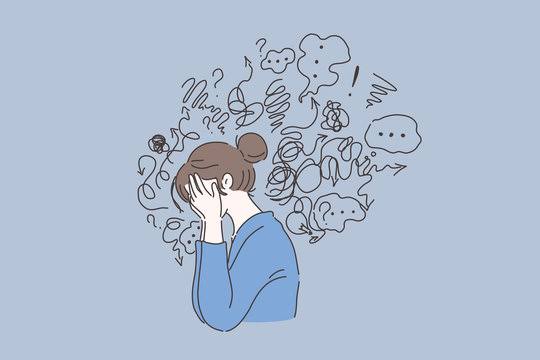#mentalhealth
#MentalHealthMatters
#MentalHealthAwareness
#Anxiety disorder is a condition characterized by excessive worry, fear, and unease. People with anxiety disorder often experience intense and persistent feelings of tension, nervousness, and restlessness.
#MentalHealthMatters
#MentalHealthAwareness
#Anxiety disorder is a condition characterized by excessive worry, fear, and unease. People with anxiety disorder often experience intense and persistent feelings of tension, nervousness, and restlessness.

🌳 Common symptoms include rapid heartbeat, shortness of breath, sweating, trembling, and difficulty concentrating.
➡️ Strategies to overcome anxiety
🍄 Identify triggers: Pay attention to situations, thoughts, or events that tend to trigger your anxiety. Knowing your triggers can help you prepare and develop strategies to cope with them effectively.
🍄 Identify triggers: Pay attention to situations, thoughts, or events that tend to trigger your anxiety. Knowing your triggers can help you prepare and develop strategies to cope with them effectively.
🍄 Challenge negative thoughts: Anxiety often involves distorted or irrational thinking patterns. When you notice negative thoughts, challenge them by asking for evidence or considering alternative explanations. Replace negative thoughts with more realistic and positive ones.
🍄 Practice relaxation techniques: Incorporate relaxation techniques into your daily routine to calm your mind and body. Deep breathing exercises, progressive muscle relaxation, guided imagery, and meditation can help reduce anxiety symptoms.
🍄 Gradual exposure: Gradually expose yourself to situations or activities that make you anxious. Start with small steps and gradually increase the level of exposure over time. This process can help desensitize you to anxiety-provoking situations.
🍄 Utilize grounding techniques: Grounding techniques can help you stay present and connected to reality when anxiety becomes overwhelming. Focus on your senses by noticing specific sounds, textures, or smells around you.
🍄 Set realistic goals: Break down larger tasks or goals into smaller, manageable steps. Setting achievable goals allows you to make progress while minimizing overwhelm and anxiety.
🍄 Engage in regular exercise: Exercise is not only beneficial for physical health but also for mental well-being. Engaging in regular physical activity helps reduce anxiety, releases endorphins, and promotes a sense of relaxation and well-being.
🍄 Practice self-care: Prioritize self-care activities that nourish your mind, body, and spirit. This can include getting enough sleep, eating nutritious meals, engaging in hobbies or activities you enjoy, and setting aside time for relaxation and self-reflection.
🍄 Seek social support: Reach out to friends, family, or support groups who can provide understanding, empathy, and encouragement. Sharing your feelings and experiences with others can help alleviate anxiety and provide a sense of connection.
🍄 Limit caffeine and alcohol intake: Caffeine and alcohol can exacerbate anxiety symptoms. Reduce or eliminate your consumption of caffeinated beverages and limit alcohol intake to help manage anxiety more effectively.
🍄 Get professional help: If anxiety persists and significantly impacts your daily life, consider seeking professional help from a therapist or counselor. They can provide specialized guidance, support, and evidence-based treatments tailored to your specific needs.
🍄 Practice self-compassion: Be kind and gentle with yourself. Recognize that anxiety is a common struggle and that it does not define your worth. Treat yourself with compassion and patience as you work towards managing and overcoming anxiety.
🍄 Establish a routine: Creating a structured routine can provide a sense of stability and predictability, which can help reduce anxiety. Plan your day, set specific goals, and allocate time for self-care, relaxation, and activities that bring you joy.
🍄 Monitor and limit news exposure: Constant exposure to distressing news can increase anxiety levels. Stay informed, but set boundaries around your media consumption.Choose reliable sources of information & limit the amount of news you consume to protect your mental well-being.
🍄 Celebrate small victories: Acknowledge and celebrate your progress, no matter how small. Overcoming anxiety takes time and effort, so be proud of yourself for each step you take towards managing and overcoming your anxiety.
@threadreaderapp unroll
• • •
Missing some Tweet in this thread? You can try to
force a refresh

 Read on Twitter
Read on Twitter









